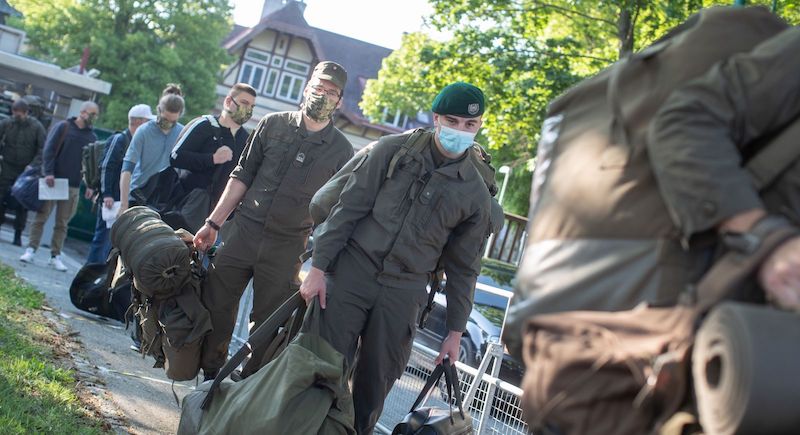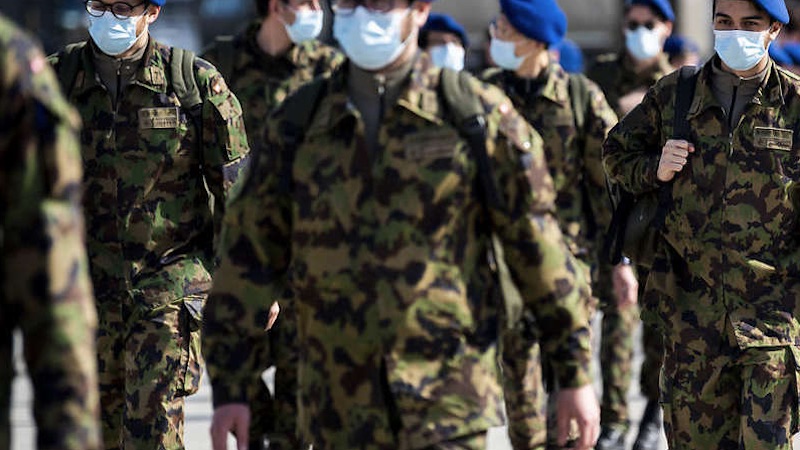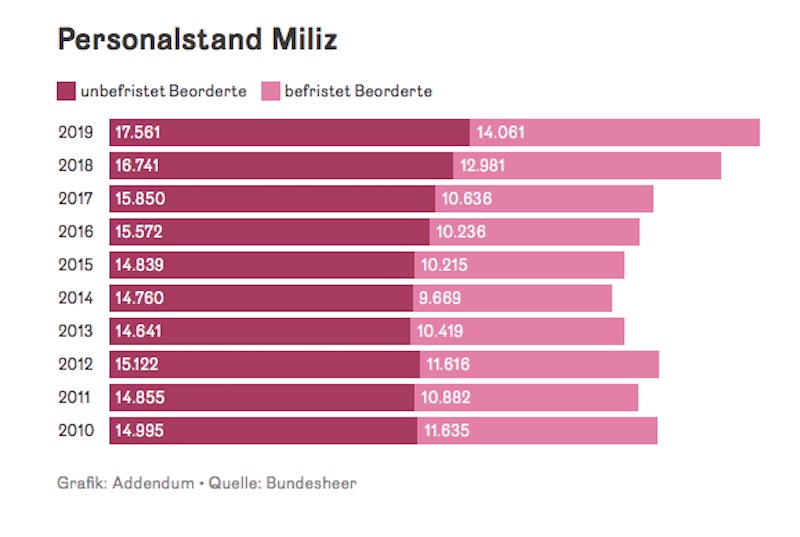Get the weekly SPARTANAT newsletter.
Your bonus: the free E-Book from SPARTANAT.

On March 18, the government laid the foundation for the mobilization of the militia. On May 18, the soldiers set out for the first time. In Switzerland, citizen-soldiers were in action in the Corona crisis three days after the alert. Is that how it should be? ADDENDUM sought explanations.
K. has been wearing two different types of uniforms for many years. One consists of a two-piece suit, shirt, tie, and elegant shoes. "As a manager, you need that, at least sometimes." In his spare time, however, he wears heavy boots, the 1975 field uniform in the RAL 7013 color, and - if necessary - a assault rifle.
K. is a Second Lieutenant and a soldier in the militia. Loyal to the Bundesheer. And as a citizen and taxpayer, he is still surprised at how the first partial mobilization of the Austrian army is proceeding in the context of the Corona crisis. Like other soldiers we spoke to for this research, he cannot speak openly. The system does not appreciate it when it is publicly pointed out how things could be done differently. How? "Faster, more coordinated, without egos between professional and militia forces. And without excessive self-portrayal by the political leadership."
But is it really like that? Where is K. right, and where would criticism of the Bundesheer, which is undoubtedly making an important contribution to crisis management at the moment, be unjust?
The fact is: On March 18, shortly after the coronavirus-induced "shutdown" of the Republic, the government in the Council of Ministers laid the groundwork for the (partial) mobilization of the militia of the Bundesheer. On May 4, the soldiers moved in, underwent a two-week training despite parts of the militia regularly practicing, and will actually go into action on May 18. Specifically: Support for the police (object protection, patrol duty, border protection) and support for other authorities in the context of disaster relief (taking commuters' temperatures at the borders, logistics, etc.). Public and economic life should have slowly returned to normal by this time, the peak of the virus spread has long since passed (Where the Coronavirus is spreading in Austria).
For comparison: The 2,000 volunteer civilian service workers were deployed to (more or less) relevant positions within two weeks at the beginning of the crisis (Civilian service extended: Was that necessary?). The militia of the Swiss Army took from the alert (March 16) to movement including readiness for deployment (March 19) three days. What does this say?
Swiss Army: Similar, and not so
Comparisons with Switzerland are a touchy subject in the brick building of the Ministry of Defense on the Viennese Danube Canal. When it comes to equipping oneself with financial resources, one likes to refer to the comrades in the neighboring country as a desirable role model. Comparisons of a military and organizational nature are less welcome in the Rossauer Kaserne. Switzerland, it is said, operates a different system.

Swiss Army soldier in Corona operation. 35,000 civilians are in a state of heightened readiness and can be called up via SMS, phone, and mobile app within days.
Right. And yet not. Both countries actually have comparable wording in their constitutions stating that the army is fundamentally to be structured according to the militia principle. However, political and military leadership interpret this differently. While Bern fully supports this idea, having just under 3,000 full-time professionals but 140,000 militia soldiers, the Bundesheer has developed towards a civil-servant professional army despite its mandate: 15,000 full-time soldiers and 7,000 other civilian employees face 31,000 militia members, the majority of whom have never practiced, and there is not enough equipment for many of them.
"It's a scandal that we as an emergency organization need two months."
One of the few who openly criticizes the mobilization of the militia is Martin Stift. Civilian until recently in a leading position in the aviation sector, he has been a member of the Vienna 1 Rifle Battalion militarily for many years, well networked in the Bundesheer up to the leadership level, and: President of the Militia Interest Group. In view of the ongoing preparations, he says: "For me, it's a scandal that we as an emergency organization need two months to mobilize. This is diametrically opposed to our long-established and extensively practiced rapid response."
Stift is convinced that the militia, which otherwise largely organizes itself and whose members are well connected, is currently once again being slowed down by the bureaucracy of the ministry. "Within a few hours, only my battalion had enough volunteers for a whole company on the internal communication channels."
High exemption rate
Instead, the Ministry is now calling up soldiers from the central office who apparently have no desire for the most part. It was announced on Wednesday that the Bundesheer is currently facing a large number of exemption requests, which apparently are being granted quite generously. 20 percent, that's one in five alerted, may stay home. This is common, according to Defense Minister .
On March 22, the minister, Chief of Staff Robert Brieger, and militia liaison officer Erwin Hameseder appeared at a joint press conference. 3,000 citizen soldiers, it was said at the time, were to be called up. Now there is talk of only 2,300. Why?
On the one hand, the reduction is due to changes in the situation during the long lead-up time. It could even be somewhat less, as the results of the medical examinations are still pending. In any case, the Defense Ministry assured us that "the strengths of the companies for the upcoming tasks will definitely be sufficient." The police to be supported also seem to be convinced: In conversations with employees of two state police headquarters, we informally learned that they still do not really know how to specifically use the military support.
On the other hand - see above - the Army Command is facing many rejections that - apparently - cannot be replaced. This is a situation that members of the militia warned the ministry about in mid-March. The consideration at that time was: Under the initial impressions of the crisis, the willingness to engage was high, and the difficulties for employers were manageable. Later, when the economy tries to slowly ramp up again, it will be much harder to get militia members, who actually have a job, out of the company and into the deployment. Into a deployment whose "hot phase" will already be over by then.
Wrong timing?
"However, this scenario seems to be happening now," believes militia representative Martin Stift. He is of the opinion that the immediate deployment of his comrades in mid-March would have been a gain for everyone, for companies, employees threatened with short-time work and layoffs, society, and the Bundesheer. "And those who would have to be replaced after the deployment could then have been replaced by already available professional soldiers." Would have. It turned out differently.
Although the almost two-month lead-up can be critically assessed, it can also be said that it was planned that way from the beginning and with good reasons for operational preparation. The Defense Ministry said back then (and still does today) that the mobilized companies of the militia should replace units already deployed in operations. "The goal of the Bundesheer is the sustainable assurance of operations through forward-looking planning," according to the strategy at the ministry.
In detail:
"First, strong leadership forces were used, who were then replaced by companies with reserve presence servicemen. In the second phase, the militia is now being used. This way, the operational servicemen can be released from their deployment. At the same time, new basic conscripts are being trained so that there will be sufficient forces available to replace the militia in the middle of the year."
Within the troops and away from press conferences and official social media channels, there seems to be unrest. Over the past few weeks, we have had contact with numerous soldiers from various areas. All of them reported that it feels good to be needed in their current situation and therefore to be on duty. And they all described that things could be even better. Below is a small excerpt from their reports.
Career soldier D. tells of a deployment of comrades at the AGES Corona hotline. For several dozen soldiers, it was not possible in the described case to get enough vehicles for transportation. So the operation started with a subway ride. Not that this would be beneath the dignity of a soldier, but: "If even one of them had contracted the coronavirus there, telephone service would not have been possible." Furthermore, the man suspects that the current deployment for the Army is not as demanding as the high command and political leadership portray it outwardly. "It is inexplicable that almost 15,000 professional soldiers and 8,000 conscripted basic recruits fail to ."
Another career soldier, a commander of a platoon deployed at the border, describes the Defense Minister's statement ("Our Army is operational in crises") as "a lie in the face of the population". An assessment he also shared in writing with comrades. What he criticizes? Him and his soldiers lacked the simple yet fundamental things in the deployment (supporting the police): vehicles, stab vests, safety holsters for pistols, handcuffs, flashlights for vehicle inspections at night, and: protective clothing and disinfectants. The army leadership sees this differently for the newly deployed: "The necessary equipment and gear for the deployment of the militia is provided."
A soldier from the militia reports that he did not even know he belonged to the militia until he received his summons. "Or at least I had suppressed it," he tells us. P. is one of the so-called "temporarily ordered." These are basic recruits who have been disarmed over the past five years and received a "provisioning note." This does not apply to everyone. Unlike those who voluntarily commit to regular training, temporarily ordered militia members were previously referred to as "card soldiers." After the duty to practice for basic recruits fell after the turn of the millennium, the Ministry had to somehow achieve the requirement to mobilize up to 55,000 men in an emergency. Temporarily ordered account for almost half of the militia personnel now. And have not exercised since the end of basic training (see graphic).
But there is more that is bothering the preparations. It's about money. And about the suboptimal communication of the leadership with their own soldiers. An argument in which the Freedom Party military union is also involved and - quite in line with military tactics - identifies and attacks its own goals. In the crosshairs: The ÖVP minister and her party colleagues in the government.
As early as April, the union calculated that it could be difficult to explain to soldiers in the deployment why there are highly disparate payments for the same work. A sergeant who volunteers for a so-called "voluntary weapons exercise" (fWÜ) is supposed to earn 9,508 euros for three months. A mobilized sergeant with a deployment order 5,207 euros (plus loss of earnings if he has a civilian income).
Switzerland sends soldiers home again
According to information from the Armed Forces Command, in the course of the Corona deployment of the militia, it is now possible that soldiers serve with four different pay scales due to the filling of vacancies in a unit by different groups of people. The information on this changed almost daily on the Bundesheer website recently.
A confusing situation that the comrades in Switzerland do not know. "With us, everyone from the helper to the bank director knows exactly beforehand what they earn: 80 percent of their civilian salary," says Daniel Reist. He is the spokesperson for the army and has been quite busy in recent weeks due to the Corona deployment. While the militia of the Bundesheer has not even been ordered back to the barracks, Switzerland is already sending its soldiers home again.
Almost 400 of the called-up 4,000 have already been released back to civilian life. Another 1,800 are to
SPARTANAT is the online magazine for Military News, Tactical Life, Gear & Reviews.
Send us your news: [email protected]
Ad
similar
Get the weekly SPARTANAT newsletter.
Your bonus: the free E-Book from SPARTANAT.




